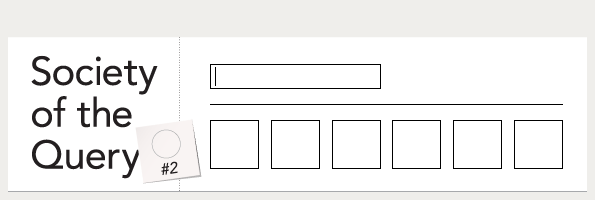 The term Googlization, according to Siva Vaidhyanathan, is the process of being processed, rendered, and represented by Google.
The term Googlization, according to Siva Vaidhyanathan, is the process of being processed, rendered, and represented by Google.
Vaidhyanathan’s upcoming book The Googlization of Everything investigates the actions and intentions behind the Google corporation. This afternoon at The Society of the Query Vaidhyanathan choose one issue from his book: the politics and implications of Google Maps’ Street View.
According to EU law: there cannot be any identifiable information about a person in Google Street View. Google’ s standard defense up till now has been that they respect privacy by scrambling faces and license plates, to which Vaidhyanathan commented,
In my former neighborhood in New York there were probably 50 illegal gambling institutions around. Now, imagine an image of me on Google Street View taken in proximity to one of these illegal places. I’m more than two meters tall and I’m a very heavy man. You could blur my face forever, I’m still bald. In New York, usually I was walking around my neighborhood with a white dog with brown spots, everyone in the neighborhood knew that dog. So you could blur my face and it still wouldn’t matter – it’s me, I’m obviously me. Anonymization isn’t an effective measure, as we’ve already found out with data. (most likely referring to the AOL case of user #4417749)
Just this morning Swiss authorities made a statement that they plan on bringing a lawsuit against Google in the Federal Administrative Tribunal because Google isn’t meeting the country’s demands for tighter privacy protection with Google Street View. Vaidhyanathan commenting on the news said, “Google Street View has been entering so many areas of friction and resistance – this brings it to our attention that the game is over for Google.”
Vaidhyanathan’s criticism of Google Street View continued with Google’s trouble in Tokyo. “The strongest reaction against Google Street View has been in Japan,” he said, “Google will scrap all of their data from Japan and re-shoot the entire country. Google mismeasured how the Japanese deal with public space. In the older sections of Tokyo the street in front of one’s house is considered the person’s responsibility, it is seen as an extension of their house. Thus, Google Street View is actually invading someone’s private space.”
Earlier this year Google CEO Eric Schmidt made the following remark about the international appeal of Google,
The most common question I get about Google is ‘how is it different everywhere else?’ and I am sorry to tell you that it’s not. People still care about Britney Spears in these other countries. It’s really very disturbing.
Vaidhyanathan explained this as being a part of Google’s protocol imperialism,
Google isn’t particularly American, nor is it particularly American / Western European. It’s important to remember that Google is much more a factor of daily life in Europe. In the United States it is just barely 70% of the search market, in Western Europe it is around 90% and in places like Portugal it is 96% and I don’t know why.
For Vaidhyanathan the biggest problem with Google is that as it expands into more parts of the world that are less proficient, and less digitally inclined, there will be more examples of friction and harm because more people are going to lack the awareness to cleanse their record.
It’s important to note that Google does offer services for protecting and managing user data:
- Google Street View allows you to report objectionable content
- Google dashboard shows a summary of all the data Google stores about you.
- An engineering team within Google that refer to themselves as The Data Liberation Front is working to make it easier for users to control the data they store in Google’s products.
Vaidhyanathan didn’t specifically mention these options, but briefly acknowledged the existence of such tools before quickly moving onto the strongest part of his argument, “We in this room are not likely to be harmed by Google because all of us in this room are part of a techno-cosmopolitan elite. Only the elite and proficient get to opt out.”

In closing, Vaidhyanathan exemplified the problem with a photograph of a man caught on the side of a U.S. highway and commented, “This man doesn’t know that he is in Google Street View so we get to laugh at him. Not knowing is going to be the key to being a victim in this system.”
More information about Siva Vaidhyanathan and his criticism of Google can be found on his website, and in this lively Google debate at IQ2 and New York Times article from last year.


